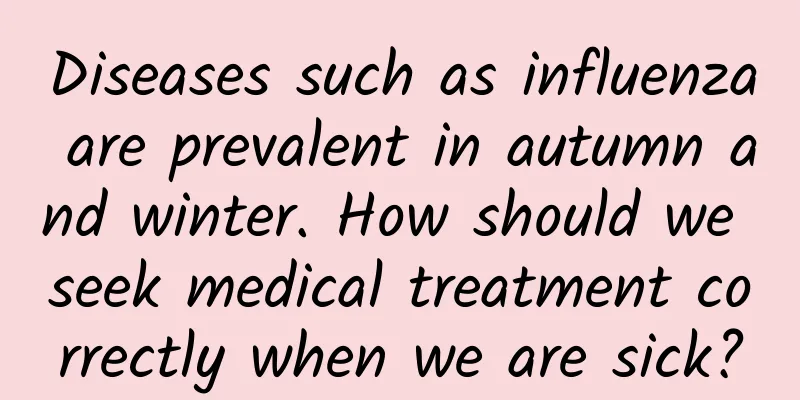Diseases such as influenza are prevalent in autumn and winter. How should we seek medical treatment correctly when we are sick?

|
Editor's note: The global COVID-19 pandemic is still spreading. Autumn and winter are the peak seasons for respiratory infectious diseases such as influenza. Many people are worried about whether it is safe to go to the hospital for treatment when they are sick. What should they pay attention to? How to seek medical treatment correctly? Beijing Center for Disease Control and Prevention reminds you to do the following: 1. It is recommended to seek medical treatment nearby, make an appointment and familiarize yourself with the layout and process of the hospital departments, minimize the time of consultation, and prepare masks, disinfectant wipes or hand sanitizer. 2. When going to the hospital, try to choose transportation methods such as walking, cycling, or driving a private car. If you take public transportation, wear a mask throughout the ride, pay attention to keep a safe distance from other passengers, and try to open windows for ventilation while riding. 3. See a doctor at different time periods, follow the hospital's diagnosis and treatment procedures and standards for fever patients, and accept the guidance of hospital staff. Wear a mask throughout the process, keep a distance of more than 1 meter from others when waiting for treatment and queuing, and take good personal protection. 4. Try to reduce the number of accompanying persons to the hospital, especially if the patient is a child. The number of parents accompanying the child with fever should be reduced as much as possible. 5. Reduce touching the surfaces of public facilities such as door handles, registration machines, cash machines, and toilets. Wash your hands in time or use hand sanitizer after touching them and before and after using the toilet. Do not touch your mouth, eyes, or nose with your hands. Try to walk up the stairs. If you take a cabin elevator, spread out the elevator to avoid too many people in the elevator. 6. Keep your hands clean. If it is inconvenient to wash your hands, you can use hand sanitizer. Pay attention to social distance. When coughing or sneezing, cover your mouth and nose with a tissue or elbow. Wrap oral and nasal secretions or spit with a tissue and discard in a covered trash can. 7. Leave as soon as possible after the consultation. Wash your hands with hand sanitizer or soap and running water when you return home. You can also rub your hands directly with hand sanitizer. Change your outer clothes and wash them as soon as possible. Tip: These five groups of people should be careful about influenza Common complications of influenza include pneumonia, laryngitis, myocarditis, rhabdomyolysis syndrome, meningitis, encephalitis, septic shock... No matter which complication the patient develops, it may cause serious consequences. Among them, pneumonia is the main cause of severe illness and death in influenza patients. People of all ages may be threatened by influenza. Huang Yi, chief physician of the Department of Respiratory and Critical Care Medicine at the First Affiliated Hospital of the Naval Medical University, reminded: "Compared with other groups, there are five groups of people who are at the greatest risk and should be especially careful before the flu season arrives: pregnant women at any stage of pregnancy; children under 5 years old; people over 65 years old; people with chronic diseases such as HIV infection/AIDS, asthma, heart and lung diseases, and diabetes; people at higher risk of influenza exposure, including medical workers. Influenza is highly contagious, so for us, protecting ourselves can build a wall of protection for the elderly and children at home." When someone in your family is diagnosed with influenza, good isolation is an important measure to reduce the risk of infection. During the isolation period, you need to pay attention to the following: 1. Wear a mask: It is best for influenza patients to live in separate rooms from their families. When they are in the same room with others or go out, they should wear a mask (not a mask with an exhalation valve). 2. Wash your hands frequently: The virus is usually transmitted through contaminated hands contacting the conjunctiva and oral and nasal mucosa. Timely and correct hand washing is as important as wearing a mask. It is recommended to wash your hands with soap and running water or wipe and disinfect with alcohol-containing quick hand disinfectant (gel). 3. Maintain good hygiene and health habits: Do not spit anywhere, cover your mouth with a napkin or elbow when coughing or sneezing, family members do not share towels and toothbrushes, keep furniture and tableware clean, dry clothes and quilts frequently, and open windows for ventilation frequently. 4. Do a good job of health monitoring for yourself and your family members: Take the initiative to measure your body temperature when you feel feverish. If there are children at home, touch the child's forehead in the morning and evening. If there is a fever, measure the temperature for them in time. Once there is a fever or respiratory symptoms such as coughing, go to the nearest fever clinic for treatment in time. 5. Prepare common supplies: household thermometer, disposable medical surgical masks, 75% alcohol, 84 disinfectant, etc. |
>>: What is the smallest whale in adult size? (Vajita whale in Mexico)
Recommend
Bilateral ovarian cyst formation
In today's society, women suffer from a lot o...
What to do if you have chest pain while taking birth control pills
Women often experience some adverse symptoms when...
Delayed menstruation makes people feel tired and sleepy
Menstruation is a physiological condition that oc...
What to do if postpartum hemorrhage recurs?
Pregnant women are weak after giving birth and ar...
Uterine pain in early pregnancy
In the early stages of pregnancy, it is very easy...
What causes early menopause?
Women generally enter menopause around the age of...
Should I buy whole fat or skim fat when I'm pregnant?
The difference between low-fat milk and skim milk...
What to do if a woman's heels are cracked
Some people's heels are always cracking and p...
Quantum health products, anti-aging functional foods? Pseudo-concepts, real traps!
Quantum health products dressed in high-tech garb...
Can Hua Xiaoran powder enlarge breasts?
Breasts are like a woman's "second face&...
When is the luteal phase
The luteal phase usually refers to the period fro...
Female hip pain
Pain is a very common symptom in daily life. Pain...
My period is fifteen days late.
The menstrual cycle is about twenty-five to thirt...
How to eliminate stretch marks for pregnant women
Being a mother is the greatest profession in the ...
What should I do if I miss the best time for abortion?
Unexpected pregnancy is a very common phenomenon....









